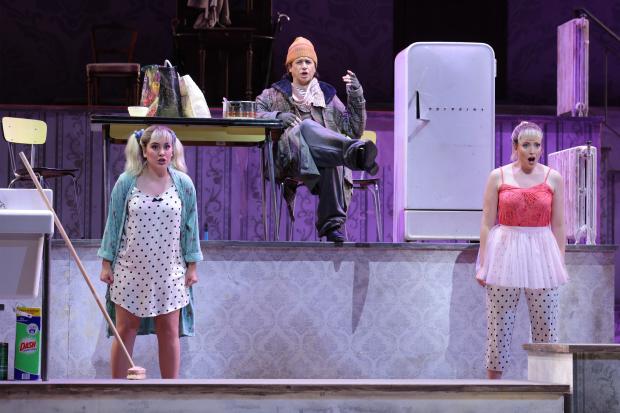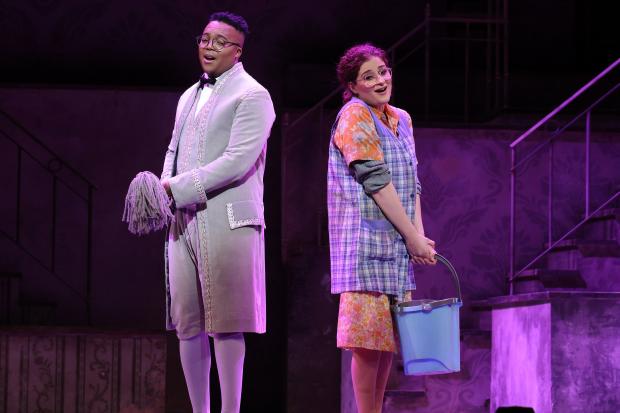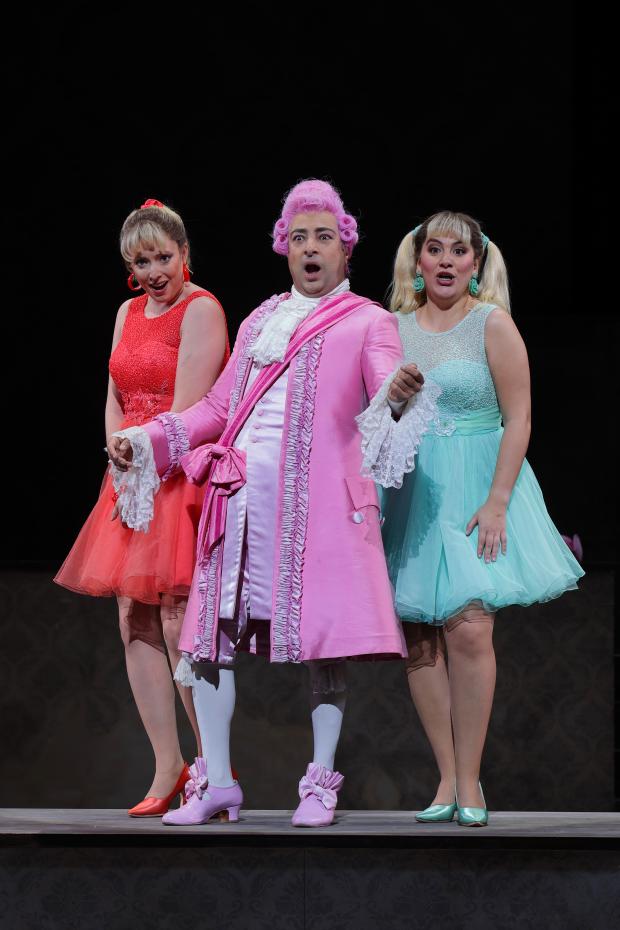LA Opera’s version of Gioachino Rossini’s 1817 Cinderella (or, in Italian, La Cenerentola) is by far my favorite production of this season. Indeed, La Cenerentola is one of the most enchanting, charming operas I’ve ever seen mounted at the Dorothy Chandler Pavilion, full of the joie de vivre of Mozart’s ebullient works, notably The Marriage of Figaro. La Cenerentola is absolutely the perfect choice for the holiday and is ideal for bringing children to share in the enchantment, especially to the matinee performances.
There are17th century written versions of Cinderella and by 1812 the renowned Brothers Grimm wrote their own iteration of the fairy tale. In essence, Rossini and librettist Jacopo Ferretti adapted French author Charles Perrault’s folk tale published in 1697, Cendrillon, which means “The Glass Slipper.” However, La Cenerentola doesn’t have any glassy footwear or pumpkin carriages per se, although Rossini’s opera does follow most of the other conventions of this age-old, beloved children’s fable, which can also be read as a parable of class struggle.
Cinderella (Neapolitan mezzo-soprano Serena Malfi makes her splendid debut at LA Opera) plays the exploited housemaid who works her proverbial fingers to the bone trying to clean Don Magnifco’s (Italian baritone Alessandro Corbelli, who first played this role at the Dorothy Chandler in 2013) ramshackle household, which has seen better days. The down-on-his-luck Don and Cinderella’s haughty stepsisters, Tisbe (Mexican mezzo-soprano Gabriela Flores) and Clorinda (Rhode Islander soprano Erica Petrocelli) mercilessly oppress their hardworking part-sibling, who is reminiscent of Carol Burnett’s iconic charwoman.
The arrogant, vain Tisbe and Clorinda are each played as a cross between a “valley girl” and a “mean girl” with comic panache, and along with their father, Don Magnifico, form a cruel clique who constantly overwork and verbally abuse poor Cinderella. The status conscious trio dream of rising on the rungs of the social ladder, and the means of doing so seems to materialize when the realm’s most eligible bachelor, known in the pantomime version of Cinderella as “Prince Charming” but called here Don Ramiro (South African tenor Levy Sekgapane), announces that he is seeking to marry and is holding a ball at his palace where he’ll select his bride to be. (One can see how powerful this mythos still is in those insipid mating/dating “reality” TV series – but that’s another story, or should I say “fairy tale”?)
La Cenerentola is full of that tried-and-true plot point of hidden or mistaken identities, which here aim at revealing one’s authentic, inner, true self. Although the buffoonish, pompous, vainglorious Don Magnifico – who rather hilariously dreams of donkeys – provides lots of laughs and comic relief in Rossini’s dramma giocoso and is played with great effect by Corbelli, he is outdone by Moscow baritone Rodion Pogossov as what may well be opera’s funniest character of all time, Dandini.
I presume that Dandini’s name is derived from the word “Dandy.” He is the prince’s manservant, but Don Ramiro has charged Dandini with impersonating him as part of Ramiro’s scheme to find the ideal woman to be his wife. This Dandini does with great zest, the servant throws himself into the role with the speed and force of a Sandy Koufax fastball, and plays his princely part with great exaggerated pomposity (that comes to irk His Highness, as Don Ramiro at times is pretending to be his servant). The exuberant Pogossov steals every scene the audience is lucky enough to see him in like an operatic kleptomaniac.
Pogossov’s Dandini, as the pretend prince, is a sheer delight to behold, and calls to mind other archetypal characters of the stage who are lowly born in an unfair, unequal world and yearn to have a more exalted status and fortune. First and foremost is the ancient Roman playwright Titus Plautus’ title character in the 191 B.C. play Pseudolus. The irrepressible Zero Mostel, who defied the House Un-American Activities Committee during the 1950s, made his comeback from the Hollywood Blacklist playing Pseudolus on Broadway in 1962 in A Funny Thing Happened on the Way to the Forum, which Stephen Sondheim, Larry Gelbart and Burt Shevelove adapted into a musical from Plautus’s original.
In it, of course, the toga-clad Zero portrays Pseudolus as the slave longing to be free, as Mostel also did in Richard Lester’s 1966 movie version. Zero similarly (and quite gloriously) played Tevye – the simple Ukrainian Jewish dairyman in Czarist Russia – in a bigger Broadway hit, 1964’s immortal Fiddler on the Roof, who famously wonders: “Lord… You decreed I should be what I am. Would it spoil some vast eternal plan? If I were a wealthy man.”
The character of Figaro, who strives to rise above his station as a mere servant in a class conscious world, is derived from 18th century playwright Pierre Beaumarchais’ plays, and of course figures prominently in Mozart’s aforementioned 1786 The Marriage of Figaro and in Rossini’s own 1816 The Barber of Seville. In any case, Pogossov’s hysterically funny Dandini alone is worth the price of admission, but truth be told, the rest of this production of La Cenerentola directed by Parisian Laurent Pelly and conducted by Italian Roberto Abbado from Milan (both making their LA Opera debut) is enough to make fans feel happy to be alive, if only so that one can partake of such a joyous spectacle. All of the performers richly deserved the standing ovations and bravos heaped upon them like laurels upon conquering heroes by the enthusiastic audience after the final curtain of the two-act opera, that ran almost three and a half hours.
Pelly also designed the costumes with French collaborator Jean-Jacques Delmotte, and like the imaginative, whimsical scenery that often moves across (or up and down) the stage by Parisian Chantal Thomas, includes modern day references with 18th century stylings. For instance, Cinderella the washerwoman has a washing machine and dryer, for some ahistorical (if hysterical) reason. The group of 15 male courtiers, who are clad in pink period garb and recur throughout the opera, were likewise extremely droll and aud favorites, presided impeccably over by chorus director Grant Gershon.
As for the music, I quote Johannes Jansen in Opera, An Illustrated Historical Overview: “What makes Rossini’s operas… so exquisite is their catchy but never trite melodies and their rhythmically pleasing orchestration which literally vibrates with energy” – and joy, I may add. It is also worth pointing out that in this production, LA Opera is continuing its progressive practice of “nontraditional” casting, and a Black South African is cast in the Prince Charming role opposite a white European Cinderella.
From Cinderella’s exploitation to Dandini’s putting on of royal airs to Don Magnifico’s desire for his daughters to marry regal heirs, La Cenerentola is an extremely class aware opera. But what is Rossini’s solution to rising above inequality? Certainly not revolution – but by having the high and mighty bestow his status and stature on subjects like Cinderella who are worthy because of their innate goodness and virtuous character. In La Cenerentola, it is by Don Romiro marrying Cinderella, thus rescuing her from the cinders and placing the good-hearted girl upon the throne, where she belongs.
But Rossini may subvert this fairy tale solution to class struggle at the very end, when Cinderella is in the limelight, alone onstage, still dressed in her rags as the Carol Burnett-like charwoman. She’s glammed down now – not [PLOT SPOILER ALERT!] wearing the gown that helped attract the prince to her at the ball. Is Prince Charming really going to marry her and save Cinderella from her wretchedness … or was it all just the suffering cleaning woman’s fantastical dream???
You see and decide for yourself. Celebrate the holidays and bring the children – especially to the afternoon matinees. And don’t miss Pogossov’s poseur, his fine and dandy Dandini, arguably opera’s funniest character.
CINDERELLA, LA CENERENTOLA is being performed Sundays Nov. 28 and Dec. 12 at 2:00 p.m.; and on Dec. 1, 4 and 8 at 7:30 p.m., at the Dorothy Chandler Pavilion, 135 N. Grand Avenue, Los Angeles CA, 90012. For tickets: Cinderella | LA Opera; (213)972-8001.



